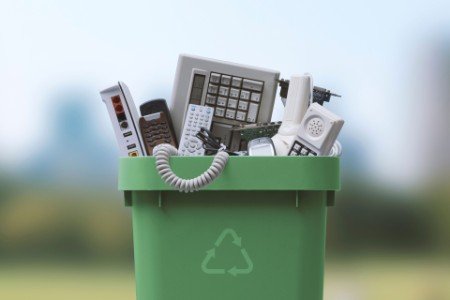In our rapidly advancing digital age, the ubiquity of electronic devices has led to an ever-growing stream of electronic waste, or e-waste. As businesses and individuals upgrade their gadgets, the question of what to do with outdated electronics becomes increasingly pressing. Fortunately, electronic recycling offers a sustainable solution that not only benefits the environment but also holds significant economic advantages for both businesses and communities.
Reducing Environmental Impact
The environmental benefits of e-waste recycling are well-documented, but the economic advantages are equally compelling. Electronic devices often contain valuable materials such as gold, silver, copper, and rare earth metals. Through responsible recycling practices, these materials can be recovered and reused in the production of new electronics, reducing the need for virgin resources.
Job Creation and Economic Stimulus
One of the most notable economic benefits of e-waste recycling is the potential for job creation. The recycling industry, particularly e-waste recycling facilities, requires skilled workers for the collection, dismantling, and processing of electronic components. This not only generates employment opportunities but also contributes to economic stimulus within local communities.
By supporting and investing in e-waste recycling initiatives, businesses can actively participate in job creation and foster economic growth. As the demand for electronic devices continues to rise, establishing a robust recycling infrastructure becomes imperative for sustaining economic development.
Resource Conservation and Cost Savings
Businesses that engage in e-waste recycling can reap the rewards of resource conservation and cost savings. Recovering and reusing materials from discarded electronics can significantly reduce the need for mining and extraction of raw materials. This, in turn, mitigates the environmental impact associated with these processes.
From a financial perspective, businesses can benefit from cost savings by sourcing recycled materials instead of relying solely on newly mined resources. This creates a more sustainable and cost-effective supply chain, positively impacting the bottom line while promoting responsible business practices.
Compliance with Regulatory Standards
As governments worldwide prioritize environmental sustainability, regulatory standards related to electronic waste disposal and recycling are becoming more stringent. Businesses that adopt e-waste recycling practices demonstrate a commitment to compliance with these regulations, avoiding potential legal issues and associated penalties.
Meeting regulatory standards not only safeguards businesses against legal consequences but also enhances their reputation as environmentally responsible entities. This positive image can attract environmentally conscious consumers, creating additional economic benefits through increased customer loyalty and trust.
Community Engagement and Education
E waste recycling initiatives provide an excellent opportunity for businesses to engage with their communities and educate the public about responsible electronic disposal. Hosting educational events, partnering with local schools, and promoting recycling awareness can enhance a company’s reputation and foster a sense of community responsibility.
By actively participating in community engagement initiatives, businesses can create a positive impact on both the local environment and the economy. Additionally, a well-informed community is more likely to support and participate in electronic recycling programs, contributing to the overall success of sustainable initiatives.
In conclusion, embracing e-waste recycling is not only a responsible environmental choice but also a sound economic decision for businesses and communities. From job creation and economic stimulus to resource conservation and cost savings, the benefits of electronic recycling extend far beyond the environmental realm. By integrating e-waste recycling into their operations, businesses can position themselves as leaders in sustainability while positively influencing their bottom line.
